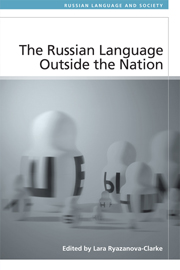Book contents
- Frontmatter
- Contents
- Notes on Contributors
- Cyrillic Transliteration System Adopted in the Book
- Introduction: The Russian Language, Challenged by Globalisation
- PART I Russian and Its Legal Status
- 1 International Law, Minority Language Rights and Russian(s) in the ‘Near Abroad’
- 2 The Russian Language in Ukraine: Complicit in Genocide, or Victim of State-Building?
- PART II Linguistic Perceptions and Symbolic Values
- PART III Russian-Speaking Communities and Identity Negotiations
- PART IV Language Contact and the Globalisation of Russian
- PART V Globalisation of Russian as Soft Power
- Index
1 - International Law, Minority Language Rights and Russian(s) in the ‘Near Abroad’
from PART I - Russian and Its Legal Status
Published online by Cambridge University Press: 05 September 2014
- Frontmatter
- Contents
- Notes on Contributors
- Cyrillic Transliteration System Adopted in the Book
- Introduction: The Russian Language, Challenged by Globalisation
- PART I Russian and Its Legal Status
- 1 International Law, Minority Language Rights and Russian(s) in the ‘Near Abroad’
- 2 The Russian Language in Ukraine: Complicit in Genocide, or Victim of State-Building?
- PART II Linguistic Perceptions and Symbolic Values
- PART III Russian-Speaking Communities and Identity Negotiations
- PART IV Language Contact and the Globalisation of Russian
- PART V Globalisation of Russian as Soft Power
- Index
Summary
Many New Independent States (NIS) have experienced (but, frequently, not resolved) conflicting pressures to establish a national language as an exercise in nation building, and to protect the rights of their ethno-linguistic minorities. These powerfully competing demands have been felt to varying degrees in all of the nations of the ‘near abroad’. The legal regimes in these nations have sought to strike a balance between the need to establish and promote the use of a national language while protecting the rights of linguistic minorities – in particular, the Russian-speaking minority. The legal provisions applicable to the Russian language and the Russian-speaking communities in the ‘near abroad’ consist of a variety of domestic legislation – constitutions, laws on language, citizenship, elections, education, the media and so forth.
In addition to this domestic legislation, in a majority of the nations of the NIS there is a substantial international component. All of the post-Soviet countries are members of the United Nations, a majority of them are members of the Council of Europe, and three have joined the European Union. Each of these international organisations has adopted legally binding instruments addressing minority linguistic rights. These international instruments take on added significance because several of the former Soviet republics have adopted constitutional provisions assimilating international treaty obligations to the status of domestic law. As a result, international law on the subject of minority language rights has assumed great significance for this discussion.
- Type
- Chapter
- Information
- The Russian Language Outside the Nation , pp. 33 - 55Publisher: Edinburgh University PressPrint publication year: 2014

